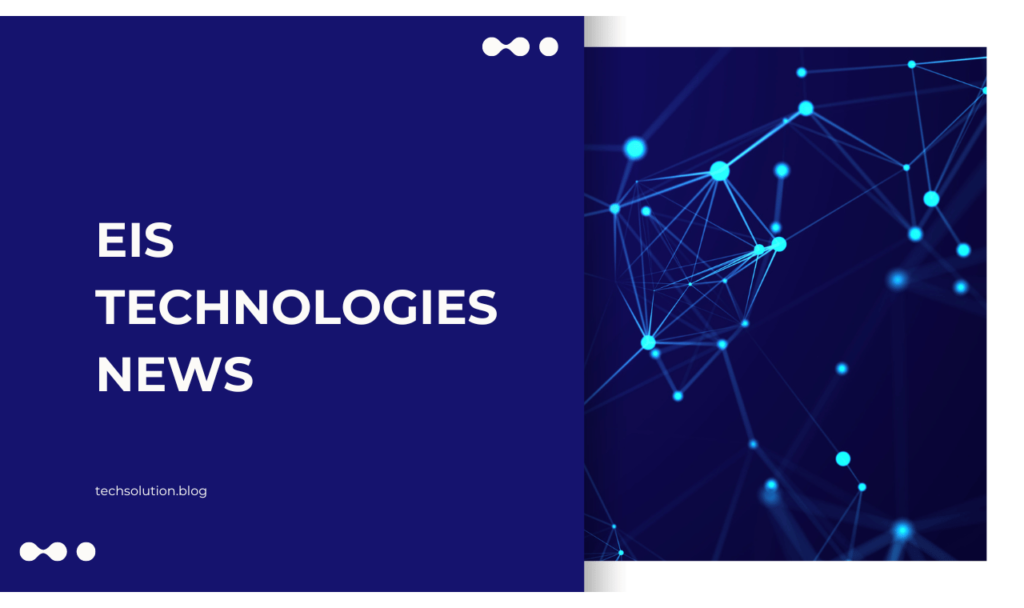In the fast-paced world of business intelligence, staying ahead isn’t a luxury—it’s a necessity. According to Gartner, organizations that leverage modern analytics platforms like EIS Technologies are 30% more likely to outperform their competitors. That’s not just a stat—it’s a wake-up call.
EIS Technologies is revolutionizing how businesses interact with data. But what exactly is EIS Technologies News, and why should you care? In a world where actionable insights can make or break a strategy, keeping up with the latest innovations isn’t just important—it’s critical.
This blog will take you behind the scenes of EIS Technologies News, unpacking the updates, advancements, and features driving success for organizations worldwide. Whether you’re a decision-maker, an IT professional, or a data enthusiast, this is your front-row seat to the future of intelligent business solutions. Let’s dive in!
Why You Should Know About EIS Technologies?

1. The Rise of EIS Technologies
Regarding technological advancements, EIS technologies are at the forefront of innovation. Over the past few years, numerous developments in the EIS landscape have been driven by the rapid growth of digital transformation. Companies worldwide are adopting EIS technologies to improve productivity, reduce operational costs, and enhance customer experiences.
One of the major trends shaping the EIS technology space is the growing use of cloud-based EIS solutions. Cloud technology offers greater flexibility, scalability, and cost-efficiency, allowing businesses to manage their operations remotely and access data from anywhere in the world. Additionally, cloud-based EIS systems have advanced security features that safeguard sensitive business data, a key concern for companies as cyber threats become more sophisticated.
2. Artificial Intelligence (AI) and Machine Learning in EIS
Artificial Intelligence and Machine Learning are no longer just buzzwords but essential components of modern EIS technologies. By integrating AI into EIS systems, businesses can automate repetitive tasks, predict trends, and enhance decision-making capabilities. For instance, AI-driven analytics tools help companies process vast amounts of data to uncover valuable insights, which can be used to optimize business strategies.
On the other hand, machine learning algorithms can analyze historical data to forecast future trends, helping companies stay ahead of the competition. In customer service, AI-powered chatbots integrated with CRM systems enable faster response times and improved customer satisfaction.
As more organizations recognize the potential of AI and Machine Learning in EIS technologies, the demand for these intelligent systems continues to grow. In fact, recent news highlights how companies in various sectors, from manufacturing to healthcare, are leveraging these technologies to enhance efficiency and gain a competitive edge.
3. The Role of Big Data in EIS Technologies
Another important aspect of EIS technologies is the incorporation of Big Data. In today’s digital era, businesses generate and store enormous amounts of data, which can be overwhelming without the right tools to analyze and manage it. EIS systems equipped with Big Data analytics capabilities allow companies to make sense of this data and use it to drive decision-making.
By analyzing customer behavior, market trends, and internal operations, organizations can identify opportunities for growth and innovation. Additionally, Big Data is crucial in improving supply chain efficiency, enhancing product development, and personalizing marketing strategies. News surrounding EIS technologies frequently emphasizes the importance of data-driven decision-making in the modern business environment.
4. EIS Technologies and the Internet of Things (IoT)
Integrating the Internet of Things (IoT) with EIS technologies is another groundbreaking development making headlines. IoT devices generate real-time data that can be fed into EIS systems, providing businesses with a more comprehensive view of their operations. This integration allows for better monitoring, control, and automation of processes.
For example, in the manufacturing industry, IoT sensors can be installed in machinery to track performance and predict maintenance needs. The data collected from these sensors is then analyzed within an EIS system to prevent costly downtime and optimize production. Similarly, IoT devices can be used in retail to track inventory levels and automatically reorder stock when necessary, ensuring a seamless supply chain.
As more industries adopt IoT-enabled EIS solutions, the possibilities for innovation are endless. News about EIS technologies often highlights how this integration is revolutionizing sectors such as healthcare, logistics, and energy management.
5. EIS Technologies and Digital Transformation
Digital transformation has become a key focus for businesses worldwide in recent years, and EIS technologies play a pivotal role in this shift. Digital transformation involves adopting digital tools and technologies to improve business processes, enhance customer experiences, and create new business models. EIS technologies provide the foundation for this transformation by enabling organizations to manage their operations more efficiently and make data-driven decisions.
EIS technologies offer various benefits supporting digital transformation initiatives, from automating administrative tasks to improving collaboration between departments. One of the key aspects of digital transformation is the shift towards remote work, which has been accelerated by the COVID-19 pandemic. Cloud-based EIS solutions enable employees to access company systems from anywhere, ensuring business continuity even in times of crisis.
Moreover, as companies strive to become more agile and responsive to changing market conditions, EIS technologies provide the tools necessary to adapt quickly. Recent news reports have highlighted how businesses invest in EIS systems to support their digital transformation journeys and stay competitive in an increasingly digital world.
6. Security Challenges in EIS Technologies
As with any technological advancement, EIS technologies are not without their challenges. One of the primary concerns for businesses is data security. With the increasing reliance on digital systems to store and manage sensitive information, companies face the risk of cyberattacks, data breaches, and other security threats.
To address these concerns, EIS providers constantly update their systems with the latest security features. This includes encryption, multi-factor authentication, and advanced threat detection systems that protect business data from unauthorized access.
Additionally, news about EIS technologies often discusses the importance of regular system updates and employee training to ensure that security protocols are followed.
The Future of EIS Technologies

The future of EIS technologies looks promising, with several emerging trends expected to shape the landscape in the coming years. One of the most significant developments is the rise of Blockchain technology in EIS systems. Blockchain offers a decentralized and secure way of recording transactions, which can be particularly useful in finance and supply chain management industries. By incorporating blockchain into EIS technologies, businesses can improve transparency, reduce fraud, and streamline processes.
Another trend to watch is the increasing use of Edge Computing in EIS systems. Edge computing involves processing data closer to the generation source (like IoT devices) rather than relying solely on centralized cloud servers. This can lead to faster data processing times, reduced latency, and more efficient bandwidth use. As more businesses adopt edge computing, we can expect to see significant improvements in the performance of EIS technologies.
Lastly, Sustainability is becoming a key focus for many organizations, and EIS technologies are playing a role in helping companies reduce their environmental footprint. From optimizing energy consumption to minimizing waste in the supply chain, EIS systems provide the tools necessary for businesses to achieve their sustainability goals.
Conclusion
EIS technologies are transforming how businesses operate by providing innovative solutions for data management, process optimization, and decision-making. EIS technologies are at the heart of digital transformation efforts across industries, from integrating AI and IoT to the rise of cloud-based systems. While challenges such as data security remain, the future of EIS technologies looks bright, with emerging trends such as blockchain and edge computing offering new opportunities for innovation.
As businesses continue to embrace these technologies, staying up-to-date with the latest EIS technologies news will be essential for organizations looking to maintain a competitive edge in the rapidly evolving digital landscape. Whether you are a business leader, IT professional, or tech enthusiast, understanding the latest developments in EIS technologies will help you navigate the future of enterprise information systems and drive success in your organization.
By staying informed and investing in the right technologies, companies can unlock new levels of efficiency, productivity, and innovation, paving the way for a more connected and data-driven future.



